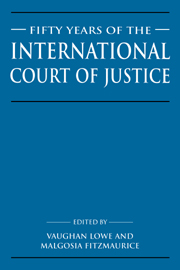Book contents
- Frontmatter
- Contents
- List of contributors
- Preface
- List of abbreviations
- Sir Robert Yewdall Jennings, by Vaughan Lowe
- List of publications of Sir Robert Jennings
- Table of cases
- Part I The International Court of Justice
- Part II The sources and evidences of international law
- Part III Substance of international law
- 10 The Court's role in relation to international organizations
- 11 Cases of the International Court of Justice relating to employment in international organizations
- 12 Jurisdiction and immunities
- 13 Adjudication as a mode of acquisition of territory?
- 14 Equitable maritime boundary delimitation
- 15 Environmental protection and the International Court of Justice
- 16 The contribution of the International Court of Justice to air law
- 17 The treatment of human rights and of aliens in the International Court of Justice
- 18 The International Court of Justice and the right of peoples to self-determination
- 19 The International Court of Justice and the peaceful settlement of disputes
- 20 The International Court of Justice and the use of force
- Part IV Procedural aspects of the work of the International Court of Justice
- Part V The International Court of Justice and the United Nations
- Index
17 - The treatment of human rights and of aliens in the International Court of Justice
Published online by Cambridge University Press: 02 November 2009
- Frontmatter
- Contents
- List of contributors
- Preface
- List of abbreviations
- Sir Robert Yewdall Jennings, by Vaughan Lowe
- List of publications of Sir Robert Jennings
- Table of cases
- Part I The International Court of Justice
- Part II The sources and evidences of international law
- Part III Substance of international law
- 10 The Court's role in relation to international organizations
- 11 Cases of the International Court of Justice relating to employment in international organizations
- 12 Jurisdiction and immunities
- 13 Adjudication as a mode of acquisition of territory?
- 14 Equitable maritime boundary delimitation
- 15 Environmental protection and the International Court of Justice
- 16 The contribution of the International Court of Justice to air law
- 17 The treatment of human rights and of aliens in the International Court of Justice
- 18 The International Court of Justice and the right of peoples to self-determination
- 19 The International Court of Justice and the peaceful settlement of disputes
- 20 The International Court of Justice and the use of force
- Part IV Procedural aspects of the work of the International Court of Justice
- Part V The International Court of Justice and the United Nations
- Index
Summary
IN THE PERMANENT COURT OF INTERNATIONAL JUSTICE
Problems of the treatment of aliens and of human rights loomed large in the Permanent Court of International Justice. In the sphere of human rights, the Court's seminal Advisory Opinion on Jurisdiction of the Court of Danzig early established that the very object of an international agreement may be the adoption of some definite rules creating individual rights and obligations – which in 1928 was, in Lauterpacht's words, ‘in effect a revolutionary pronouncement’. Earlier, in 1923, in its Opinion on Nationality Decrees issued in Tunis and Morocco, the Court had held that the question of whether a certain matter is or is not solely within the jurisdiction of a state ‘is an essentially relative question; it depends upon the development of international relations’. Accordingly, as Professors McDougal, Lasswell and Chen put it: ‘The choice between “international concern” and “domestic jurisdiction” was thus made to depend not only upon fact, but upon changing fact, permitting a continuing readjustment of inclusive and exclusive competences as conditions might require.’ In its Advisory Opinion in the same year on German Settlers in Poland, the Court interpreted ‘civil rights’ as embracing property rights, and it debarred discrimination in fact even if discrimination in form is absent.
- Type
- Chapter
- Information
- Fifty Years of the International Court of JusticeEssays in Honour of Sir Robert Jennings, pp. 327 - 350Publisher: Cambridge University PressPrint publication year: 1996
- 2
- Cited by



